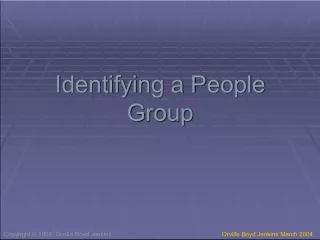Identifying Entrepreneurs: The Organizer of School Car Wash and More


The twelfth chapter of our entrepreneurship guide focuses on identifying the individuals who exemplify the entrepreneurial spirit. These are the people who see a need within their community
- Uploaded on | 2 Views
-
 alisondunne
alisondunne
About Identifying Entrepreneurs: The Organizer of School Car Wash and More
PowerPoint presentation about 'Identifying Entrepreneurs: The Organizer of School Car Wash and More'. This presentation describes the topic on The twelfth chapter of our entrepreneurship guide focuses on identifying the individuals who exemplify the entrepreneurial spirit. These are the people who see a need within their community. The key topics included in this slideshow are . Download this presentation absolutely free.
Presentation Transcript
Slide1EntrepreneurshipChapter 12
Slide2Do you want to see an entrepreneur ? Look for the organizer of a school car wash or someone selling customized T-shirts outside a ball game or a concert. In every case some enterprising person decided that there was a need for a certain product and acted to fill that need. These entrepreneurs also hoped that they would make enough money to cover the costs of, for instance, the T- shirts and the screen-printing materials, with some money left over- profit . Every entrepreneur who starts a business does the same thing: identifies an opportunity based on a need, takes the risk of producing a product or a service to meet that need, and hopes for a profit.
Slide3Entrepreneurship And Small BusinessAn entrepreneur is a person who recognizes a business opportunity and who organizes, manages and assumes the risks of a business enterprise focusing on that business opportunity. Every year thousands of entrepreneurs start small businesses. Many of these small businesses won’t last more than three years. In 1994, almost 25 percent of businesses failed three years or less after they had begun.
Slide4If those businesses do succeed, their ownersoften hope that someday their companies will become industry giants like Microsoft, Kodak, or McDonald’s All of those were started by single entrepreneurs and became more successful than anyone ever imagined. However, there are many entrepreneurs who do not dream of great fame or riches. They simply are people who want to be their own bosses and make their own business decisions.
Slide5We usually think of local businesses suchas service stations, print shops, appliance stores, restaurants and video stores as small businesses. A small business is an independently owned and managed business that serves a limited geographic area and is not dominant in its industry. Though these businesses are small, they are started and maintained by people with an entrepreneurial spirit.
Slide6Small businesses have a tremendous impacton our economy. There are small businesses in all industries, however, the service and retail industries dominate the small business area. More than half of small businesses are found in these two areas. As you may recall, service industries are the fastest growing part of a country’s economy. It is likely that the number of small businesses in the service industry may increase.
Slide7QUICK CHECK • 1. What is an entrepreneur?
Slide8Characteristics of an Entrepreneur? Not everyone is suited to be an entrepreneur– which may be a good thing. After all, if everyone started their own business, there would not be anyone left to work at those businesses! Entrepreneurs are take-charge people who want to work for themselves. Even though they know that many small businesses fail, they are willing to take the risk and face the uncertainty .
Slide9Desire for IndependenceOf all the characteristics of entrepreneurs, the most consistent one is this: They are very independent. Entrepreneurs simply rather work for themselves than for someone else. They want to make their own decisions. In fact, some say that people who have been fired are good candidates to become entrepreneurs because they may have proven that they are independent enough to run their own businesses .
Slide10Self-ConfidenceEntrepreneurs have confidence in their ability to meet the challenges of running a business. They have a great deal of self-motivation , that is, they set their own goals rather than having them set by a manager or boss. They work hard to reach their goals, which shows they have self- discipline. They correct errors and prove their own performance without any prompting from someone else. These are confident people who believe in what they are doing and believe that the job is worth doing.
Slide11Willingness to Take RisksAnother characteristic of entrepreneurs is their willingness to take risks. Most successful entrepreneurs say that they do not take risks, they take calculated risks. That means that they have thought about their project carefully and tried to figure out in advance the the probability of success is high. Either formally or informally, entrepreneurs conduct market research to be sure that there is a need for their product. There are some questions that an entrepreneur may ask themselves when they are calculating risks. That preliminary work can lead them to the concluding that their business has a good change to succeed .
Slide12Here are a few sample questions:• Is the goal worth the risk? • How can I minimize my risks? • What information do I need to take before I take the risk? • Why is it risk important? • Am I willing to try my best to achieve the goal? • What preparation do I need to make before I take the risk? • What are the biggest obstacles to achieving my goal?
Slide13Even though entrepreneurs work veryhard to succeed, they also are willing to fail. They would rather take the risk and learn from their failures than never take the risk at all. And very often, if they fail, they turn around and try again. Many entrepreneurs fail four or five times before they finally become successful.
Slide14Ability to Recognize OpportunityEntrepreneurs are individuals who recognize opportunities on which to build a business. In many instances, they are opportunities that are bypassed by others. These opportunities may include meeting a demand that is not currently being met, putting out a product that is much better than what is currently on the market, or solving a problem or annoyance that consumers have. An entrepreneur not only has the ability to recognize the opportunity, but also has the ability to develop a business that provides goods or services consistent with the opportunity.
Slide15QUICK CHECK 1. What are four important characteristics entrepreneurs? 2. Define self-motivation, self-discipline and calculated risk?
Slide16Advantages of EntrepreneurshipEntrepreneurs are not necessarily people who go into businesses because they like danger. There are many advantages to having their own business. For instance, many people who have discovered that they do not have enough opportunities in their professions solve the problems by starting businesses of their own. This is especially true for women and members of minority groups. In the 1980s, there was a dramatic, increase in the number of women-owned firms. And that trend has continued. The National Foundation for Women Business Owners reported that in 1994 women owned at least 7.7 million businesses and provided employment for 15.5 million people. There are clear benefits to starting a small business.
Slide17SatisfactionMany people start a business when they discover a service or product that can fill a need or want in society. That is true whether the business is a catering service for parties and weddings a refuge for injured wild animals and birds, or a computer software company. Transforming an idea into a successful business is very rewarding. Owners often think that the reward is well worth the time an effort they devote to their businesses. They like the feeling that they alone have built a business and make it successful.
Slide18Full Use of SkillsMany entrepreneurs work for other businesses before they go off on their own. They accumulate experience in their specialty, and they often also gain skills in management, planning, and finances. At some point in their careers, they decided that they want to use those skills in businesses of their own. A hairdresser opens his own shop. A chef opens her own restaurant. A financial manager opens an account business. For similar reasons artistic people also may open their own businesses. They know that they may never make a great deal of money from their paintings, sculptures, jewelry, or music. Nonetheless they have decided that they prefer to use their talents as a business.
Slide19ProfitIf you work for someone else, you may have the security of a regular paycheck. But the profit from the product you produce, whether it is a new hairdo or an automobile, goes to the company. Your salary is paid out of the money the company makes. Many entrepreneurs decide that they no longer want to work to make a profit for someone else. Even though they are fully responsible for the finances and bills of their own business, many business owners decide they want the full benefits of their own labours.
Slide20QUICK CHECK 1. What are three advantages of entrepreneurship? 2. Which advantage is most attractive to you?
Slide21Disadvantages of EntrepreneurshipBeing successful is not easy. You do not just start a business and watch the profits roll in. Consider large businesses. There are officers—each has a president, vice presidents, and managers. There are departments that are responsible for everything from ordering supplies to setting the work schedule for employees. The person who cleans the floor does not usually have the responsibility of boxing up the product and shipping it to customers. If you begin your own business, however, those descriptions do not apply.
Slide22Total ResponsibilityAn entrepreneur just starting out is in charge of everything. That means that the company’s success or failure depends on just one person—the owner. The owner must manage workers, manufacturing, and shipping. He or she has to find customers, sell the product, and be certain that orders are met. The owner of a restaurant must acquire the licenses and permits from the city handle the advertising, order supplies, make sure the food is of high quality, schedule the wait staff and so on,. No matter what the size the business is, the owner still has all of the responsibility. If the business grows, the owner may hire people to carry out some of these duties. Even then the owner is the one who is ultimately responsible.
Slide23Long, Irregular HoursBeing your own boss is a lot of work. Studies show that people who start their own businesses work more hours than those who work for someone else. It is not unusual for their schedules to extend to more than 60 hours a week. Weekends are often time for work, just as week days are. This should not be surprising. If you are responsible for everything, your work is going to take a great deal of time.
Slide24Financial RisksThe most serious disadvantage of a small business is the need for money. It takes money to get a business going. The owner has to obtain space for the business; furnish it with things such as desks, filing cabinets, and computers; and employ workers. While the business is struggling to get established, the owner has to pay bills and wages. The owner may try to borrow money from the bank, but banks are often unwilling to lend to a new business because the risks are high. What’s more, if the business fails, the owner may have to pay the company’s debts out of his or her own pocket.
Slide25QUICK CHECK 1. What are three disadvantages of entrepreneurship? 2. Which disadvantage is the greatest?
Slide26Summary• An entrepreneur is a person who recognizes an opportunity and organizes, manages, and assumes the risk of a business enterprise focused on that opportunity. • Entrepreneurs are independent, self- confident, self-motivated, and self-disciplined people who take calculated risks to open a new business.
Slide27Summary• The advantages of starting a business are the satisfaction of filling a need, the full use of the person’s skills and the profits secured from the enterprise. • The disadvantages of starting a business are that the owner has all the responsibility, must work long hours, and may have difficulties finding the money to get started.
Slide28Summary• Entrepreneurs start businesses that may become very successful companies. They also provide more employment than larger businesses . • Making informed judgments based on reliable information and reason is especially important for entrepreneurs.
Slide29Group ProjectChoose an entrepreneur that all of you admire. He or she may be a well-known historical or current figure, or someone in your community. Write a one hundred word biography of the person and examine the characteristics that made him or her successful. Include graphics in the biography if possible. Create a power point display with the results.























